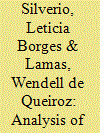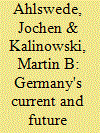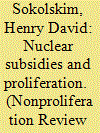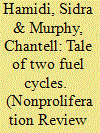|
|
|
Sort Order |
|
|
|
Items / Page
|
|
|
|
|
|
|
| Srl | Item |
| 1 |
ID:
101400


|
|
|
|
|
| Publication |
2011.
|
| Summary/Abstract |
Nuclear energy comes back to the discussions on the world stage as an energy source that does not contribute to global warming during production process. It can be chosen as the main source of power generation in some countries or complement the energy matrix in others. In this context, there is the need to develop new technologies for the management of radioactive waste generated by the production process. Final repositories for spent fuel are not yet in commercial operation, and techniques for fuel reprocessing have been developed, because after use, the fuel still has materials that produce energy. Some countries already use reprocessing, and develop research to make it more secure and more competitive, while others prefer to adopt policies to prevent developments in this area due to the problem of nuclear proliferation. In another line of research, new reactors are being developed in order to reduce the amount of waste in energy production and some will be designed to work in closed loop, recycling the materials generated.
|
|
|
|
|
|
|
|
|
|
|
|
|
|
|
|
| 2 |
ID:
107515


|
|
|
|
|
| Publication |
2011.
|
| Summary/Abstract |
Although China's nuclear power industry is relatively young and the management of its spent nuclear fuel is not yet a concern, China's commitment to nuclear energy and its rapid pace of development require detailed analyses of its future spent fuel management policies. The purpose of this study is to provide an overview of China's fuel cycle program and its reprocessing policy, and to suggest strategies for managing its future fuel cycle program. The study is broken into four sections. The first reviews China's current nuclear fuel cycle program and facilities. The second discusses China's current spent fuel management methods and the storage capability of China's 13 operational nuclear power plants. The third estimates China's total accumulated spent fuel, its required spent fuel storage from present day until 2035, when China expects its first commercialized fast neutron reactors to be operational, and its likely demand for uranium resources. The fourth examines several spent fuel management scenarios for the present period up until 2035; the financial cost and proliferation risk of each scenario is evaluated. The study concludes that China can and should maintain a reprocessing operation to meet its R&D activities before its fast reactor program is further developed.
|
|
|
|
|
|
|
|
|
|
|
|
|
|
|
|
| 3 |
ID:
072176


|
|
|
| 4 |
ID:
114438


|
|
|
|
|
| Publication |
2012.
|
| Summary/Abstract |
In the past, Germany reprocessed a significant amount of its spent nuclear fuel, partly on its own territory but mostly as a customer of British and French reprocessing plants. In mid-2005, Germany stopped this practice, banning new transports of spent fuel for reprocessing-although the already-exported material would be allowed to be reprocessed and recycled in German reactors as mixed-oxide (MOX) fuel. In total, about 6,500 tonnes of heavy metal have been contracted for reprocessing, but a significant portion of this material has neither been reprocessed nor recycled as MOX fuel in German reactors. Due to the complex import-export history and the partly nontransparent information policy of the German government and utilities, a comprehensive and up-to-date plutonium balance for Germany is not publicly available. This report provides an assessment of Germany's plutonium inventory (stored domestically or abroad) based on open-source information. Special attention is paid to the issue of whether the entire inventory of separated plutonium can be completely irradiated in German nuclear reactors before the last of them are shut down in 2022. The authors conclude that Germany's stock of plutonium waiting to be recycled was about 12.2 tonnes as of 2010; this plutonium should be completely re-imported from the United Kingdom and France by 2017. Germany's MOX-consumption capacities should be sufficient to irradiate the remaining plutonium, although further delays are expected that could leave Germany with an inventory of separated (unirradiated) plutonium.
|
|
|
|
|
|
|
|
|
|
|
|
|
|
|
|
| 5 |
ID:
115297


|
|
|
|
|
| Publication |
2012.
|
| Summary/Abstract |
With the exception of Iran, no Middle Eastern state has an operating nuclear power reactor. Several states, including the United Arab Emirates, Saudi Arabia, Qatar, Kuwait, Israel, Syria, Jordan, Turkey, and Egypt are considering constructing such reactors; some have even taken steps towards commencing nuclear power projects. There exist, however, considerable economic, technical, safety, and security challenges to achieving these goals, many of which are acute in the Middle East region. Regional and international cooperation on nuclear technology could not only help regional states meet their energy objectives, but it could also help to build trust among states as a basic step towards a future Middle East Weapons of Mass Destruction-Free Zone.
|
|
|
|
|
|
|
|
|
|
|
|
|
|
|
|
| 6 |
ID:
144294


|
|
|
|
|
| Summary/Abstract |
In March 2015, the South Australian state government established a royal commission to investigate the financial, social, technical, diplomatic, and nonproliferation benefits and risks of expanding its nuclear industry, including activities related to uranium mining; enriching, reprocessing, and fabricating nuclear fuels for both domestic use and export; producing nuclear power; and storing radiological waste, including foreign spent reactor fuel. Given its enormous uranium reserves and current mining activities, some Australians have argued that Australia could benefit financially by expanding the mining sector and by adding value to its uranium exports by enriching the material and fabricating it into reactor fuel assemblies. Others have maintained that Australia can realize significant economic benefits by recycling and storing foreign spent fuel and producing carbon-free nuclear power. In the end, the commission recommended that Australia consider opening up a high-level waste repository to take in foreign spent fuel. It did not recommend any other nuclear activities at this time. The following viewpoint is based on testimony I delivered to the commission on the nuclear weapon proliferation implications of the proposed activities. If Australia wants to avoid the temptation of selling nuclear goods to states that might use these goods to make bombs, it should only consider new nuclear activities that can be entirely financed by the private sector and turn a profit without having to resort to foreign sales. This policy would also enable Australia to set an important, new international nonproliferation standard.
|
|
|
|
|
|
|
|
|
|
|
|
|
|
|
|
| 7 |
ID:
088050


|
|
|
|
|
| Publication |
2009.
|
| Summary/Abstract |
The purpose of this article is to explain why the world's nuclear power countries differ from each other with respect to their spent nuclear fuel (SNF) policies. The emergence and evolution of three principal SNF approaches are analyzed: direct disposal, reprocessing and SNF export. Five broad explanatory factors are identified and discussed in relation to the observed differences in policy outcomes: military ambitions and non-proliferation, technological culture, political culture and civil society, geological conditions, and energy policy. SNF policy outcomes can generally be seen to result from a complex interaction between these broad factors, but it is also possible to discern a number of important patterns. To the extent that the five factors may undergo far-reaching changes in the future, the historical experience of how they have shaped SNF policies also give a hint of possible future directions in SNF policymaking around the world.
|
|
|
|
|
|
|
|
|
|
|
|
|
|
|
|
| 8 |
ID:
191980


|
|
|
|
|
| Summary/Abstract |
In the early 2000s, the George W. Bush administration condemned Iran’s use of nuclear-fuel-cycle technologies while endorsing sensitive nuclear activities in South Korea. The politics behind this difference may appear self-evident, but maintaining this policy was premised on a complex interaction between technology and politics. This paper examines both US and international definitions of uranium enrichment and spent-fuel reprocessing and finds an incoherence between technical definitions and policy implementation. Definitions of enrichment are narrow, as they refer to a very specific set of material processes. But the Bush administration applied a capacious standard when debating what it meant for Iran to “suspend” enrichment-related activities. On the other hand, definitions of reprocessing are capacious, implicating many different processes that can be interpreted as reprocessing. And yet the Bush administration applied a narrow standard as it sought to assist South Korea’s pyroprocessing efforts. By positing a reciprocal relationship between technology and politics, this article challenges both the position that technical solutions can solve entrenched political conflicts, and also the simplified narrative that great-power politics trumps shared technical and legal standards. Interpretive conflicts over technical standards are shaped by politics, and yet technical contestation also limits and bounds political manipulation.
|
|
|
|
|
|
|
|
|
|
|
|
|
|
|
|
| 9 |
ID:
080631


|
|
|
|
|
| Publication |
2008.
|
| Summary/Abstract |
Japan's reprocessing program is proceeding at full speed, despite concerns about its effects on international efforts to control nuclear proliferation. Testing of the Rokkasho Reprocessing Plant using actual spent fuel started on March 31, 2006, and the goal for commercial operation is February 2008. If started, Rokkasho will be the first commercial-scale reprocessing plant in a non-nuclear weapon state, capable of separating 8 metric tons (MT) of plutonium per year. If this occurs, under current plans the total amount of plutonium possessed by Japan will grow from about 45 MT to about 80 MT by 2011, close to the same amount of separated plutonium manufactured for the U.S. nuclear weapons program. This paper discusses the history of efforts to build and operate Rokkasho and whether there is any prospect for a change of direction. It argues that Rokkasho should not open before a dialogue among stakeholders can be held on alternative means of managing spent fuel, such as interim dry cask storage.
|
|
|
|
|
|
|
|
|
|
|
|
|
|
|
|
|
|
|
|
|